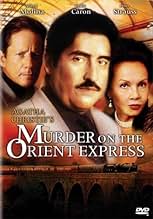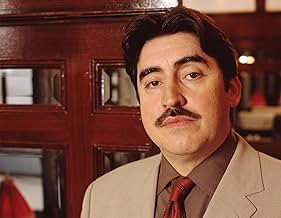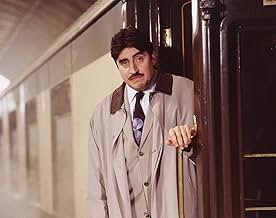Murder on the Orient Express
- TV Movie
- 2001
- 1h 40m
IMDb RATING
5.1/10
1.2K
YOUR RATING
Hercule Poirot, now in modern times, investigates the famous crime on the famed train with a modern twist.Hercule Poirot, now in modern times, investigates the famous crime on the famed train with a modern twist.Hercule Poirot, now in modern times, investigates the famous crime on the famed train with a modern twist.
Louis Chamoun
- Turk
- (uncredited)
Jason Croot
- Train Guard
- (uncredited)
- Director
- Writers
- All cast & crew
- Production, box office & more at IMDbPro
Storyline
Did you know
- TriviaCarl Schenkel's last film.
- GoofsIn the next exterior shot after departure from Istanbul, a differently colored diesel locomotive is on the train. During the night scenes before the journey is interrupted, a steam locomotive is shown. Then when the train stops at the rockfall, the same EWS diesel is back on it, but now it's facing the other way (the EWS letters and the locomotive number 47744 have swapped places as seen from the same side of the train). Finally, when the journey resumes the next night, the steam locomotive is back.
- Quotes
Mr. Samuel Ratchett: Mr. Perot?
Hercule Poirot: Perot? Like the American Presidential candidate? Certainly not! The name is Poirot! Hercule Poirot!
- ConnectionsReferenced in David Suchet on the Orient Express (2010)
Featured review
The 1974 movie of this book was a mixed bag. Obligations to the all-star cast caused most of the problems, as the writers and editors jockeyed to give everyone an equitable amount of screen time, an actorly moment and some close-ups. This prevented it from being a very deep film, and Sidney Lumet is really only a workmanlike filmmaker. But still, despite those limitations, there is much pleasure in the earlier version; the wordless flashback prologue of a kidnapping is beautifully done. Rare for a murder mystery, the unfolding of the solution provides a startling, satisfying emotional payload.
For this retelling, a decision was made to update the material to the contemporary era. The topical references that acknowledge the world has changed since the thirties really achieve naught, except perhaps alleviating some writers fear that the material is passé... There's too many of these self-conscious references (to air travel, the internet, VCRs, taking the Express out of mothballs, Ross Perot) and they become annoying. Other changes are there simply because filmmakers thought it would make it more conventional (Hercule Poirot has a ridiculous romantic interest, "Vera"). The biggest bummer is the substitution of a utilitarian diesel engine for the original stylish steam locomotive. Thud.
Ultimately these revisions add nothing to the movie and seem to have taken the focus off producing a tight, compelling, methodical script.
The highlight of the previous movie was the cross-cutting between the temporal time-frame and the crime. This movie lifts that technique, but doesn't really come up with any contribution of it's own. The color palette, the research and the envisioning of the crime were all more vivid in the earlier version.
Alfred Molina is pretty bad in this. It just isn't interesting.
For this retelling, a decision was made to update the material to the contemporary era. The topical references that acknowledge the world has changed since the thirties really achieve naught, except perhaps alleviating some writers fear that the material is passé... There's too many of these self-conscious references (to air travel, the internet, VCRs, taking the Express out of mothballs, Ross Perot) and they become annoying. Other changes are there simply because filmmakers thought it would make it more conventional (Hercule Poirot has a ridiculous romantic interest, "Vera"). The biggest bummer is the substitution of a utilitarian diesel engine for the original stylish steam locomotive. Thud.
Ultimately these revisions add nothing to the movie and seem to have taken the focus off producing a tight, compelling, methodical script.
The highlight of the previous movie was the cross-cutting between the temporal time-frame and the crime. This movie lifts that technique, but doesn't really come up with any contribution of it's own. The color palette, the research and the envisioning of the crime were all more vivid in the earlier version.
Alfred Molina is pretty bad in this. It just isn't interesting.
- onepotato2
- Jul 24, 2004
- Permalink
Details
- Release date
- Country of origin
- Languages
- Also known as
- Вбивство в Східному експресі
- Filming locations
- Istanbul, Turkey(on location)
- Production companies
- See more company credits at IMDbPro
Contribute to this page
Suggest an edit or add missing content

Top Gap
By what name was Murder on the Orient Express (2001) officially released in Canada in English?
Answer



























